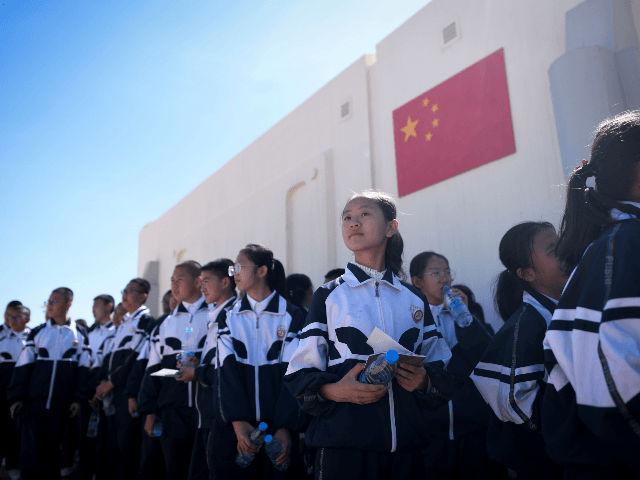China’s state-run newspaper Global Times published a column Wednesday claiming that Americans “hammer into their children’s head the belief that they are No.1” and that discrimination against Chinese people in the 1800s persists in an “American superiority complex.”
In a second piece, the Global Times insists that, thanks to China’s Belt and Road Initiative (BRI) – a plan for China to take control of the world’s most important transportation infrastructure – the future will not belong to America, but to “a new model of international relations, which is full of oriental wisdom.”
The same publication has, among other opinions, blamed America’s opioid crisis on a culture inferior to that of the Han Chinese; alleged that Brazil will never be a developed country because of its culture; and blamed Russia’s inferiority to the Chinese people for the fall of the Soviet Union.
Citing several examples of 1800s American thought on China, the Global Times claims that Americans have historically believed the “Chinese are an inferior race,” but “what divided them was the approach to this Asian people – whether the Chinese immigrants should be shunned or assimilated by an attempt to change them.”
In America today, the Times continues, “Americans are proud. Americans have heard so many times since childhood that they are the best. Each parent will hammer into their children’s head the belief that they are No.1, creating an American superiority complex.”
While the Times generously allowed the stereotype that Americans are friendly and “enthusiastic,” it insists that, “if one stays with Americans long enough, he or she would gradually feel that many of them do not consider yellow-skinned Chinese equal to themselves.”
In a different column Thursday called “World Extends Far Beyond the U.S. and West,” the Global Times rejoiced about the promise of a world in which Chinese culture would liberate the world from the confines of Western development. Noting that the United States has not joined the BRI – though China has invited Washington to allow it to reshape its core infrastructure – the newspaper suggests the plan will “show the world that in addition to the West, there is a huge stage that is full of vitality and possibilities. As the China-US trade war attracts the world’s attention and concern, we need to be more visionary to break out of the limitations brought on by a narrow-minded US.”
“A new model of international relations, which is full of oriental wisdom, is around the corner,” the Times asserts. “Countries both big and small can relate to each other on an equal footing and share mutual respect and benefits. Countries with different values and political systems can build partnerships rather than alliances.”
The Global Times’ efforts to brand other cultures, including American culture, as inferior to the dominant Han culture in China undermine its efforts to demonize Americans as bigot. The Times blamed America’s alleged “lack of values,” for example, for the national opioid crisis in the country that China has fueled by producing high volumes of the deadly synthetic opioid fentanyl.
“In the U.S., consuming marijuana is considered a private affair or even a manifestation of personality and taste,” the newspaper noted at the time. “Drug abuse in American society is very rampant with addiction multiplying sharply in many areas. It is hard to find even one young person in the country who hasn’t tried drugs.”
In an unrelated commentary on Brazil last year, the newspaper exhibited the same superior disposition to Brazil, arguing it would forever be an underdeveloped country because of its culture.
“It may sound racist to differentiate development based on culture. But after living in Brazil for a while, you will find out the answer,” an article read.
The Chinese government, outside of its propaganda arms, has launched a nationwide campaign to erase minority ethnicities, languages, and cultures with the dominant Han group. Minorities are encouraged to abandon their religions and speak only Mandarin. In the most egregious case of ethnic homogenization, China has built an estimated hundreds of labor camps to imprison Uighur, Kazakh, and Kyrgyz Chinese people in Western Xinjiang province, where the population largely does not speak Mandarin and practices Islam. The Han-dominated Communist Party calls the camps “vocational training” centers where locals learn to speak Mandarin for a better chance at a good job, but survivors say Chinese authorities torture them and indoctrinate them into worshipping the Communist Party.
The camps succeeded decades of ethnic change in Xinjiang. The Han population of Xinjiang went from six percent in 1953 to over 40 percent in 2000. The Uighur slice of the population dropped by 30 percent.
Around the world, the Han Chinese government has repeatedly shocked the world with its racial insensitivity and racist practices. In early 2018, Chinese state television aired a promotional skit to celebrate Lunar New Year that featured actors in blackface, an extremely offensive practice in the West. China’s Belt and Road foray, which the skit was meant to promote, has attracted accusations of apartheid in Africa for abuses against locals.
In Kenya, Chinese imported workers ban locals from skilled, and better paid, labor; do not allow them to sit in the cafeterias and mess halls to eat alongside Chinese workers; ban them from buses to work sites if Chinese workers are on them, and stand accused of berating and overworking Kenyans. In one particularly embarrassing incident for China last year, Kenya deported a Chinese businessman after one of his Kenyan employees recorded him calling Kenyans “monkey people,” referring to President Uhuru Kenyatta as a “monkey,” and lamenting Africans were not more like “white people.”

COMMENTS
Please let us know if you're having issues with commenting.